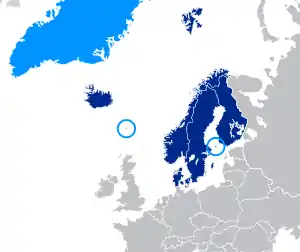Nordic Defence Cooperation
The Nordic Defence Cooperation (Nordefco) is a collaboration among the Nordic countries in the area of defense. Its five members are Denmark, Finland, Iceland, Norway, and Sweden.
 | |
| Formation | November 4, 2009 |
|---|---|
| Type | International organisation |
Membership | |
| Website | http://www.nordefco.org |
The aim of the organization is to strengthen the member countries' defense capabilities by identifying areas for cooperation and to promote effective solutions. The memorandum of understanding was signed in Helsinki on November 4, 2009, succeeding the Nordic Supportive Defence Structures (NORDSUP), the Nordic armaments cooperation (NORDAC) and the Nordic Coordinated Arrangement for Military Peace Support (NORDCAPS), previous parallel cooperative arrangements.[1]
Participation in the NORDEFCO is voluntary and states can choose which areas they want to collaborate within and to what extent. This means that cooperation can occur bilaterally as well as among all five members. It is also considered within the organizational scope to work with non-Nordic countries in fields where there is an added value to doing so. According to the official webpage, the cooperation is based on the conviction that there is much to be gained through cost sharing, joint solutions, and joint actions. However, it also underlines the fact that NORDEFCO is not a military alliance:
The NORDEFCO does not aim for new military or political alliances between the nations. Mutually reinforcing cooperation in capability development can be achieved without negative influence on participating countries' different foreign and security policy orientation and membership obligations in NATO, the EU and the UN. On the contrary, closer practical cooperation in capability development would constitute a supplemental approach in providing the capabilities and forces required by these organisations.[2]
Limitations
Practical Nordic and Scandinavian defence cooperation has been impeded by their differing memberships:
European Union |
Common Security and Defence Policy |
European Defence Agency |
Permanent Structured Cooperation |
North Atlantic Treaty Organization |
Organisation for Joint Armament Cooperation | |
|---|---|---|---|---|---|---|
| Yes | No | No | No | Yes | No | |
| Yes | Yes | Yes | Yes | No | Partial | |
| No | No | No | No | Yes | No | |
| No | Partial (non-voting) | Partial (non-voting) | No | Yes | No | |
| Yes | Yes | Yes | Yes | No | Partial |
Organization
The official presidency of the organization rotates among the member states, but the Nordic Ministers of Defence are ultimately responsible for NORDEFCO; they meet twice a year. They preside over the Nordic Defence Policy Steering Committee, composed of senior departmental officers from the member countries. Underneath this committee is the Nordic Military Coordination Committee, composed of flag officers who represent the member countries' Chiefs of Defence.
The areas of cooperation (COPAs) are divided into five sections:
- Strategic Development (COPA SD)
- Capabilities (COPA CAPA)
- Human Resources & Education (COPA HR&E)
- Training & Exercises (COPA TR&EX)
- Operations (COPA OPS)
These are staffed with senior officers from the participating countries and mandated to further coordinate and implement the given tasks. The recommendations reported back from the COPAs also form the basis for the decisions made by the Nordic Defence Policy Steering Committee and the Nordic Military Coordination Committee.
In addition to the Cooperation Areas, Acquisition & Life Cycle Support (ALCS) is tasked with coordinating and facilitating armaments relating cooperation issues. This is performed through a yearly screening process, where all participating nations provide input from their procurement plans. The plans are compared, screened, and cooperation possibilities, vetted by ALCS, are identified. If considered suitable for further cooperation, established formally as a Subgroup. These Subgroups comprise experts from the participating nations, and are tasked with establishing the foundations for how cooperation can happen; for instance gearing towards a common procurement project. Historically, such cooperation has enabled the Nordic nations to take advantage of upwards of €60 million in cost savings.
See also
References
- NORDCAPS: Official homepage of the now redundant organization.
- NORDEFCO: Official homepage of the organization.
Further reading
- Official website
- Bredesen and Friis. 2019. "Governance Entrepreneurs as Spoilers in Nordic Defence Cooperation." Journal of Regional Security (2019), 14:2, 77–100
- Håkon Lunde Saxi, 'The rise, fall and resurgence of Nordic defence cooperation', International Affairs, Volume 95, Issue 3, May 2019, Pages 659–680
- Tuomas Forsberg, 'The rise of Nordic defence cooperation: a return to regionalism?', International Affairs, Volume 89, Issue 5, September 2013, Pages 1161–1181
- Håkon Lunde Saxi, Nordic defence Cooperation after the Cold War (Oslo: Norwegian Institute for Defence Studies, 2011)
- Page Wilson & Ísak Kári Kárason (2020) "Vision accomplished? A decade of NORDEFCO." Global Affairs.